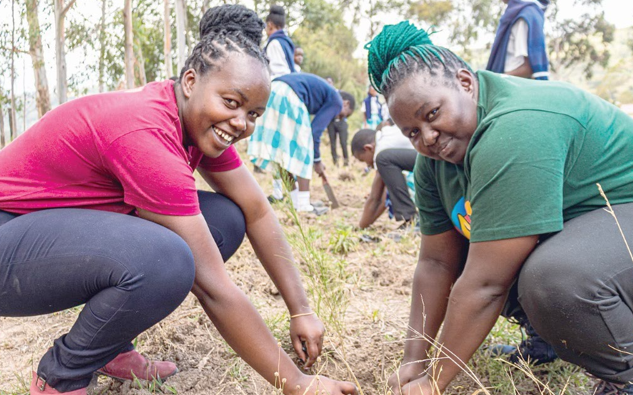Lake Naivasha rehabilitation highlights World Water Day
By Samuel Kariuki, March 22, 2024Juggling chalk in one hand and paintbrush in the other Wanjira Kamau, a teacher by profession, an artist by passion, and a humanitarian at heart is unbound to restore the purity of water in Lake Naivasha after years of pollution.
Her main focus, she explains is the conservation of water in the lake through beach clean-up, tree planting as well as educating the local community on the importance of environmental preservation and proper waste disposal methods so that it does not drain into the lake
During this year’s World Water Day celebration today, Kamau is embarking on a clean-up exercise within Naivasha town through the Rotaract Club of Naivasha as she raises awareness among the residents on the need to keep the water bodies clean.
Access to clean water
“This day is important as it reminds us that many people around the world have no access to clean water. For my community in Naivasha, access to clean water for domestic use is a challenge to many,” she said.
“If we don’t take care of this lake, then the whole of society of Naivasha will crumble,” she says. “I’m taking care of my people.” The initiative gives Rotary clubs a coordinated way to work on protecting the environment.
Activities include river cleanups, habitat restoration, native plantings, biodiversity projects, wastewater treatment and lake monitoring.
Kamau who draws her inspiration from the acts of Nobel Prize Laureate Wangari Mathai recounts how in 2019 she noticed how Lake Naivasha and its tributaries were increasingly getting polluted and decided to volunteer to clean it.
“I have been cleaning up River Maraighushu, one of the tributaries that drain in Lake Naivasha as a rehabilitation process. The lake has been affected by solid waste disposed in the water drainage system which eventually is deposited in the lake,” the environmentalist states.
She adds: “My source of motivation is realising the importance of the water in our daily lives. A French proverb says “We never know the worth of water till the well is dry.” Before we get to a crisis, I ask myself how can we conserve the resources that we have for us and our future generations.”
For the last five years, Kamau reveals that she has undertaken several cleanup exercises within Lake Naivasha and its environs, which are degraded by human activities and the growing population in Naivasha town.
She also targets two main rivers, Maraighushu and Malewa since they carry impurities downstream into the lake.
Through her initiative, over 10,000 trees were planted in a span of four years in various public spaces where she also continuously oversees the cleaning of Karagita and Kamere Public beaches in Lake Naivasha.
Environmental conservation
“We have educated the students in over 10 schools on the importance of environmental conservation and tree planting. Whenever we do a cleanup exercise, we conduct community sensitization in areas around the lake,” she says.
Her most remarkable clean-up activity was along River Maraighushu since the community was involved.
“The clean-up created an opportunity to give practical lessons on proper solid waste disposal to the biggest polluters of the river,” she adds.
Kamau is leading from the front in ensuring that the waste collected from the water bodies doesn’t find its way back into the water flow through recycling.
“I have started a recycling programme called Eunistar Art where we create home décor using non-biodegradable materials such as plastics and glassware. The aim is to clean the environment as we create employment for the youth and teenage mothers who are unable to continue with education,” she says.
However, Kamau who mostly relies on wellwishers to fund her activities said financial constraints have derailed her efforts to cover a large area within the Lake Naivasha ecosystem.
“Tackling pollution in the lake is an expensive adventure as some waste is trapped under the water. Pulling it out will require may require mechanized investments. As such we only aim to collect floating waste or that which has been washed ashore by the waves,” she said.
Capital investment
Additionally, Kamau said that her recycling project requires capital investment to acquire machines to increase work output and to replenish the materials such as paints.
She currently uses tools like a glass cutting machine, and a hot glue gun to create objects from recyclable waste.
Environmental conservation, she said is a work in progress especially at the community level though she was proud that after educating the public she is slowly seeing observable change in behavior.
The Rotary Club member says she has been working with the fishermen at the lake and local business establishments around the beaches which has made them realize that their source of livelihood is in danger of extinction when the lake is polluted.
This year’s celebration of Water Day is themed leveraging water for peace emphasizing that when water is scarce or polluted, and when people have unequal or no access, tensions can rise between communities a
According to United Nations Water, more than 3 billion people worldwide depend on water that crosses national borders, yet, out of 153 countries that share rivers, lakes and aquifers with their neighbours, only 24 countries have cooperation agreements for all their shared water.
“As climate change impacts increase, there is an urgent need, within and between countries, to unite around protecting and conserving our most precious resource. As populations grow, water will become increasingly important in the fight against poverty and the deterioration of the environment,” the UN agency says.
